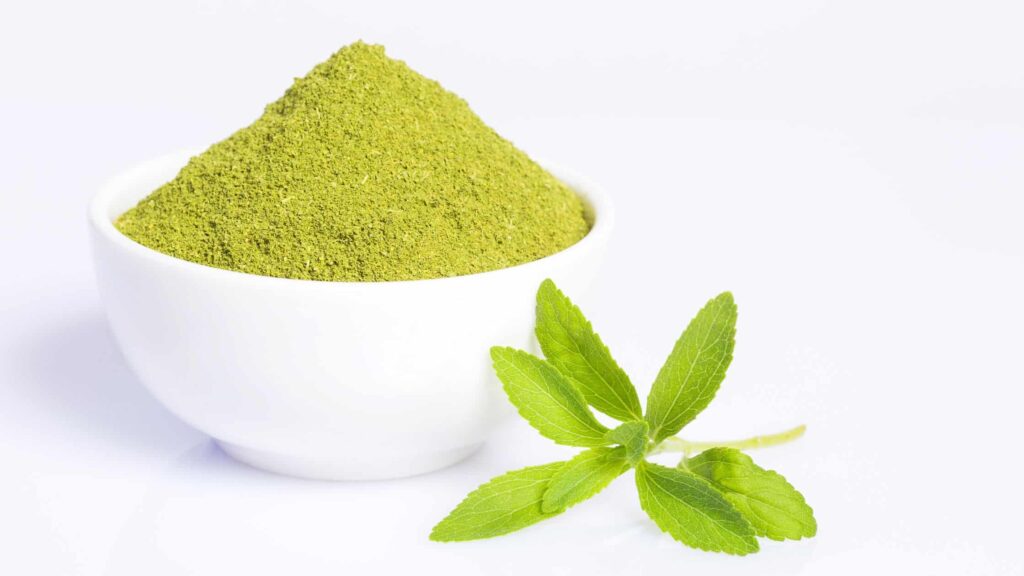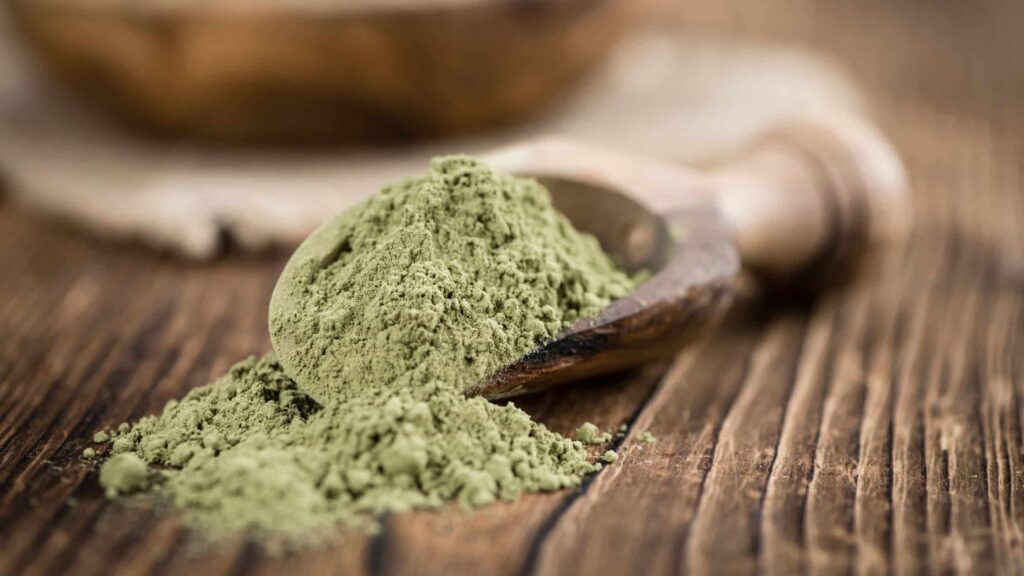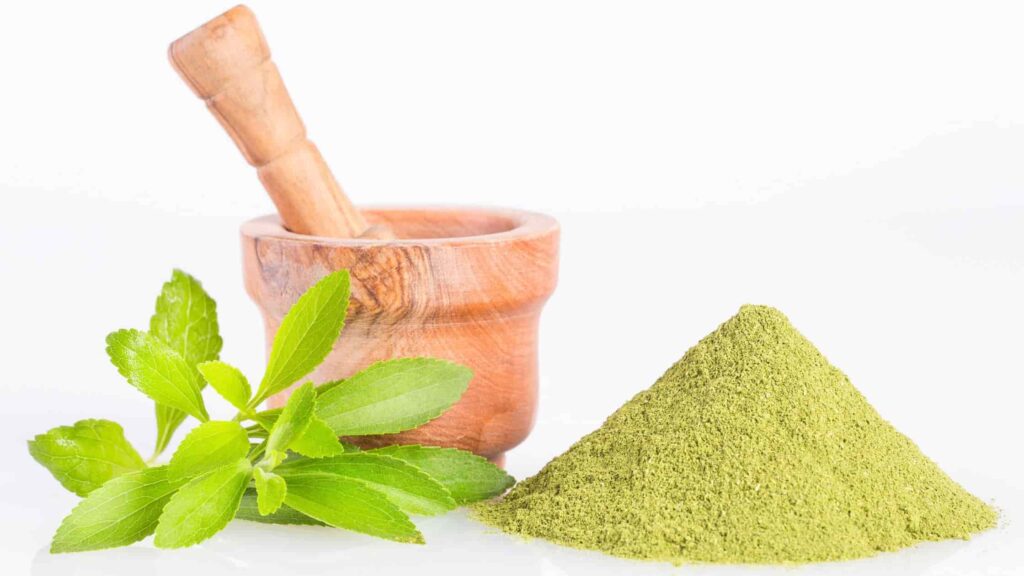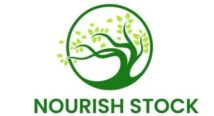I switched to stevia powder about a year ago when I began cutting down on sugar for health reasons. At first, I was skeptical—I’d tried other sugar substitutes like sucralose and aspartame before, but they always left a weird aftertaste or made me feel bloated. With stevia, it was completely different.
Stevia powder, a calorie-free natural sweetener, is made from the leaves of the Stevia rebaudiana plant.
In this article we discuss about “Stevia Powder”
Table of Contents
What Is Stevia Powder?
The plant Stevia rebaudiana is used to make stevia powder, a natural sweetener with no calories. Steviol glycosides, which are found in the leaves of the stevia plant, which is indigenous to South America, give it an intense sweetness that is 200–400 times more than that of table sugar.
Unlike artificial sweeteners, stevia powder is plant-based, making it a popular choice among people seeking healthier, more natural alternatives to sugar.

Types of Stevia Products:
- Stevia powder (white refined version) is used to sweeten food and beverages.
- Liquid stevia drops
- Dissolvable stevia tablets
- Stevia baking blends
- Tabletop packets (typically in green or white sachets)
Stevia powder is one of the most versatile forms, perfect for use in beverages, oatmeal, and low-calorie recipes.
Explain the types of Sevia products:
1. Liquid Stevia Drops:
Liquid stevia drops are a highly concentrated form of stevia extract, often blended with water, natural flavors, or alcohol as a preservative. They’re ideal for sweetening beverages like coffee, tea, smoothies, or even salad dressings. A few drops go a long way, making it easy to control sweetness without calories. They’re also fast-dissolving and great for on-the-go use.
Best for: Drinks, quick use, and precise sweetening.
2. Dissolvable Stevia Tablets:
Stevia pills dissolve rapidly in hot liquids and are small, portable sweeteners. For those who like to sweeten coffee or tea without lugging along packets or liquid bottles, these are ideal. The sweetness of each pill is usually equivalent to one teaspoon of sugar, but without the calories.
Best for: Hot beverages (coffee, tea), travel, convenience.
3. Stevia Baking Blends:
Stevia baking blends are specially formulated mixtures of stevia and other ingredients like erythritol or bulking agents to mimic the volume and texture of sugar. These blends are designed for cooking and baking, making it easier to substitute for sugar in recipes without altering consistency or taste too drastically.
Best for: Baking cakes, cookies, muffins, and other desserts.
Tabletop Packets:
Tabletop stevia packets are pre-measured servings of stevia powder, usually equivalent in sweetness to a teaspoon of sugar. These are commonly found in restaurants and homes for sweetening coffee, tea, oatmeal, or cereal. They’re a convenient and portion-controlled way to enjoy stevia without measuring.
Best for: Daily use at home or in cafés, adding to coffee, tea, and breakfast items.
Health Benefits of Stevia Powder:
1. Suitable for Diabetics:
Stevia is a safer option for diabetics because it doesn’t contain carbohydrates or change blood glucose levels. Without the metabolic hazards, it provides the sweetness of sugar.
2. Weight Management Support:
Because it contains no calories, stevia powder can be an effective part of a weight loss or weight maintenance plan, especially for those reducing sugar intake.
3. Ideal for Low-Calorie and Keto Diets:
Stevia fits perfectly into ketogenic and low-carb diets. It satisfies sweet cravings without throwing off your macronutrient goals.
4. Natural Sweetener:
Since stevia powder comes from a plant, it’s a natural substitute for artificial sweeteners like sucralose and aspartame.
How to Use Stevia Powder:
Stevia powder can be used in various ways in your kitchen.
1. Sprinkle Over Food:
Add a small amount to:
- Cereal
- Oatmeal
- Yogurt
- Fruit

2. Add to Beverages:
Perfect for sweetening:
- Coffee
- Tea
- Smoothies
- Lemonade
Cooking and Baking with Stevia Powder:
Cooking with stevia is simple, but baking may require some adjustments.
- Use proper stevia-to-sugar ratios — different brands vary.
- Because stevia lacks bulk and caramelization like sugar, you may need to add egg whites, baking soda, or other leavening agents for baked goods.
Stevia Powder vs. Other Sugar Substitutes:
1. Monk Fruit vs. Stevia:
- Another natural sweetener is monk fruit, though it can be more costly and more difficult to locate.
- Both have no calories or carbs, but some prefer stevia’s taste or versatility.
2. Artificial Sweeteners:
Stevia powder stands out from other sweeteners like:
- Aspartame (Equal, NutraSweet)
- Sucralose (Splenda)
- Saccharin (Sweet’N Low)
- Acesulfame K (Ace-K)
Since they are synthetic, there could be adverse effects. Since stevia is produced from plants, many people believe it to be more natural and tolerable.
3. Sugar Alcohols:
While sugar alcohols like xylitol and erythritol are common in sugar-free products, they can cause bloating, gas, or digestive issues. Stevia powder generally doesn’t have these side effects when used in moderation.
Possible Side Effects of Stevia Powder:
1. Is Stevia Powder Safe?
Yes, the FDA has approved refined stevia extracts, such as stevia powder. However, due to a lack of study, unprocessed extracts and raw stevia leaves are not authorized.
2. Potential Side Effects:
Some users report:
- A slight bitter or licorice aftertaste
- Digestive issues like gas or bloating (rare)
- Reactions when mixed with erythritol, which may raise heart health concerns
Always read product labels to understand what ingredients are blended with stevia powder.
Stevia Powder and Insulin Response:
According to certain research, pure stevia has little to no impact on insulin or blood sugar levels. It may even help control blood sugar levels and enhance insulin sensitivity over time, according to some data, which makes it a possible ally for people fasting for metabolic health.
Best Times to Use Stevia While Fasting:
You can safely use stevia powder in your black coffee, tea, or lemon water during your fasting window. Just avoid using it excessively or in processed “diet” products, which may contain other ingredients that could interfere with your fasting benefits.

Clean vs Blended Stevia Products:
When purchasing stevia, search for organic stevia powder or 100% pure stevia extract that is free of chemicals and fillers. A lot of commercial products dilute stevia with sugar alcohols or artificial sweeteners, which might cause gastrointestinal problems and break your fast.
Frequently Asked Question:
1. What is Stevia Powder made from?
The leaves of the Stevia rebaudiana plant are used to make stevia powder. Stevioside and rebaudioside A are the main sweet components that are isolated, refined, and dried into a fine, white powder. It is a sugar alternative that is natural and has no calories.
2. Is Stevia Powder safe to use daily?
Yes, stevia powder is generally recognized as safe (GRAS) by the FDA for daily consumption. However, it’s important to use pure stevia extract without added fillers or artificial sweeteners. Always check the label for ingredients.
3. Does Stevia Powder raise blood sugar or insulin levels?
No, pure stevia powder does not raise blood glucose or insulin levels, making it a popular choice for people with diabetes or those on low-carb diets like keto. It may even help improve insulin sensitivity in some individuals.
4. Can I use Stevia Powder for cooking and baking?
It is possible to use stevia powder in baking and cooking. You will need to change the amounts or use a stevia baking blend that contains bulking agents for a better texture, though, because it is up to 300 times sweeter than sugar.
5. What’s the difference between Stevia Powder and Liquid Stevia?
Stevia powder is a concentrated, dry form of the sweetener that is frequently found in packages or recipes. When diluted with water or alcohol, liquid stevia is perfect for adding sweetness to drinks. Although they are different in form and application, both provide the same calorie-free sweetness.
6. Is Stevia Powder better than artificial sweeteners?
Stevia powder is plant-based and free from synthetic chemicals, making it a natural alternative to artificial sweeteners like aspartame or sucralose. Many people prefer it due to its origin and minimal effect on metabolism and gut health.
7. Can I use Stevia Powder during intermittent fasting?
Yes, pure stevia powder does not break fast, as it contains zero calories and doesn’t stimulate insulin. It’s safe to use in coffee or tea during fasting windows—just ensure it’s not mixed with sugars or fillers.
8. How much Stevia Powder equals one teaspoon of sugar?
The sweetness of one teaspoon of sugar is equal to about 1/32 to 1/16 teaspoon of pure stevia powder. For precise conversions when using a stevia blend, consult the label.
9. Are there any side effects of using Stevia Powder?
Most people tolerate stevia well, but some may experience bloating or a mild aftertaste. Excessive use or blends with sugar alcohols may cause digestive discomfort in sensitive individuals.
10. Where can I buy high-quality Stevia Powder?
You can buy stevia powder at Nourish Stocks.com .Look for organic, non-GMO, and additive-free stevia for the best quality.
Conclusion:
Stevia powder is a powerful, natural alternative to sugar that offers sweetness without the calories or health risks associated with artificial sweeteners or refined sugar. Sourced from the Stevia rebaudiana plant, it’s ideal for those managing diabetes, following low-carb or keto diets, or simply aiming to reduce sugar intake.
Stevia is easy to include into your daily routine, whether you use it for coffee, baking, or regular meals in the form of liquid drops, tablets, baking blends, or tabletop packets. Additionally, it is suitable for intermittent fasting, which makes it a wise option for both health-conscious people and intermittent fasters.Stevia powder may be your best option for a sugar substitute if you’re searching for a plant-based, calorie-free sweetener that doesn’t hurt your taste or health.
